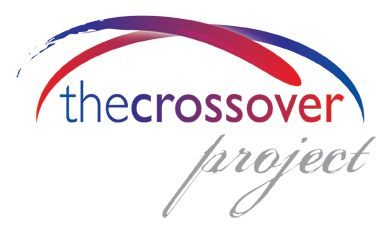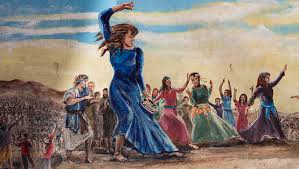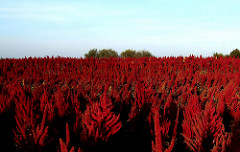Romans 12:1,2
Dr. Victoria Sarvadi
I beseech you, therefore, brethren, by the mercies of God, that you present your bodies a living sacrifice, holy, acceptable to God, which is your reasonable service. And do not be conformed to this world, but be transformed by the renewing of your mind, that you may prove what is the good and acceptable and perfect will of God (Romans 12:1,2 NKJV).
According to Exodus 12:40, the Hebrews lived in Egypt for 430 years, and in that time, they forgot about the God of their father’s and therefore Abraham, Isaac, and Jacob. Sadly, the Hebrews did not walk in the ways that were passed down for generations. On the contrary, as the years passed, they learned the ways of their Egyptian countrymen and began to worship foreign gods. When Moses and Aaron led them out of Egypt and into the wilderness, they were fearful and confused. Even though miraculous things were happening all around them as they sojourned to a land of promise, they were unfamiliar with the character and expectations of the God of Moses. But God had a covenant with their fathers, therefore these people, the seed of the patriarchs, were destined to meet their true God. It was on Mt. Sinai that Jacob’s God re-introduced Himself to Abraham’s seed.
As they trembled in fear at the base of the mountain, the Almighty (El Shaddai) gave them His instruction on how to behave, how to approach Him and how to relate to one another. This instruction is called Torah in Hebrew and is what we call the “Laws of God.”
How terrified these people must have been. Their idols never manifested such power. These instructions were strange and unique, designed to make them look and act differently than the pagan nations that filled the entire earth.
Since the fall of man, the nations were ruled by principalities and powers of the air. These rulers in high places demanded appeasement. But this God, the Creator of all things was a God of mercy. Through His prophet Moses, He taught this new (and only) nation of His chosen people the ways that separated Him from false gods.
Because God is Holy and man is not, the Holy One gave them physical and symbolic means to approach Him, a sacrificial system of offerings.
Sin and trespass offerings were mandatory offerings to make one right with God, but He also instituted voluntary offerings – a sacrifice that was from the heart. One of these voluntary free will offerings was the burnt offering.
The Burnt Offering
The burnt offering was given freely only after one had given sin and trespass offerings that atoned for overt and covert sins of the worshiper. The atoning blood of the innocent lamb symbolized a cleansing and washing of a worshiper’s heart. Only then the worshiper could offer a voluntary offering that represented his will.
The lamb could have no blemishes or imperfections. This flawless lamb represented the worshipper as thoroughly purged from the flesh and filled with the Holiness of God. He would lay his hands on the animal’s head symbolically transferring the identity of himself to that of the sacrifice.
Then he shall put his hand on the head of the burnt offering, and it will be accepted on his behalf to make atonement for him (Leviticus 1).
Just as sin and identity are transferred to the innocent animal, God, in turn, transfers His righteousness as He stretches out His hand to all humanity.
Behold, the LORD’s hand is not so short that it cannot save; Neither is His ear so dull that it cannot hear (Isaiah 59:1).
The Examination
The priest would examine the outer and inner parts of the lamb to be sure there were no visible or hidden imperfections. This act would illustrate God’s inspection of the hearts of man; even the part of man that is not readily seen. God searches the deep parts of our being. Nothing is hidden from Him.
Search me, O God and know my heart; try me and know my anxieties (thoughts) and see if there are any wicked ways in me and lead me in the way of everlasting (Psalm 139:23-24).
The priest then washes the insides and legs of the animal demonstrating that it is Messiah in the office of the High Priest that cleanses us from all unrighteousness. He transforms our very inward parts (insides) and causes us to walk in His Holiness (legs). As He changes us, we learn to stay on His paths. He shods our feet with preparation of acquiring a testimony that becomes the good news of what He has done in our lives and what Yeshua, the ultimate burnt offering of God has done on behalf of the world. Our new walk begins to bear good fruit, doing the works of the Father while imitating His Son.
It also should be noted that the groin of the animal is cleaned as it is often sexual sin that causes so many to stumble. The symbolic meaning is that we must be willing to be “opened up” and cleansed to walk in righteousness.
Priestly Offering
The animal is flayed, and the priests receive the skin as an offering (that they are permitted to keep). The skin of the animal represents our human skin or the physical flesh. And the priests represent the earthly ministry of God.
As one offers himself to God as a voluntary burnt offering, he continues to live but by the Spirit of God. This is a profound picture knowing we are crucified with Christ still, nevertheless; we live because of the purifying power of the Spirit within us. Our skin is still preserved for earthly service, but our inner man is now that of Christ. And it is through Christ that we have all been made priests, lending ourselves to His ministry on earth until He comes.
I am crucified with Christ: nevertheless, I live; yet not I, but Christ liveth in me: and the life which I now live in the flesh I live by the faith of the Son of God, who loved me and gave himself for me (Galatians 2:20 KJV).
We see Yeshua volunteer His will as a burnt offering. He rose victorious and appeared in the flesh. His skin was preserved even to the keeping of His scars as all men will see His pierced hands upon His return.
Gentiles Included
This burnt offering was exceptional, and even Gentiles were allowed to offer this sacrifice as a freewill offering to the God of Israel. As such, our offering should have no blemishes as we…
…inspect ourselves for visible and invisible imperfections.
…recognize our weaknesses.
…confess and walk away from sin.
…repent before we offer ourselves.
Consuming Fire
The fire then consumes the offering, burning all day and night as a whole or continual sacrifice unto the the Lord. As believers in Christ, we also enter the covenant by being a burnt offering. Our sacrifice becomes a more in-depth spiritual offering as we give ourselves anew every morning and evening, dying to the flesh daily. As the aroma of sacrifice (olah In Hebrew) ascends upward to Heaven, God is pleased. Man must offer his will to God and in so doing God cleanses him from all unrighteousness by His all-consuming cleansing fire that never goes out.




